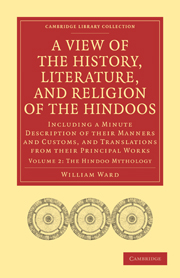 A View of the History, Literature, and Religion of the Hindoos
A View of the History, Literature, and Religion of the Hindoos Book contents
- Frontmatter
- Contents
- BOOK II OF THE TEMPLES, IMAGES, PRIESTS, AND TEMPLE WORSHIP OF THE HINDOOS
- BOOK III OF THE STATED PERIODS OF WORSHIP, AND VARIOUS DUTIES AND CEREMONIES
- BOOK V DOCTRINES OF THE HINDOO RELIGION
- BOOK VI
- BOOK VII HINDOO RELIGIOUS SECTS
- CHAP. I ACCOUNT OF THE REGULAR HINDOO SECTS
- CHAP. II ACCOUNT OF THE BOUDDHUS
- CHAP. III ACCOUNT OF THE JOINUS
- CHAP. IV ACCOUNT OF THE SHIKHS
- CHAP. V ACCOUNT OF THE FOLLOWERS OF CHOITUNYU
- CHAP. VI ANALYSIS OF ALL THE HINDOO SECTS
- CONCLUDING REMARKS
- APPENDIX: Scripture Illustrations from Hindoo Manners and Customs
CHAP. III - ACCOUNT OF THE JOINUS
Published online by Cambridge University Press: 29 August 2010
- Frontmatter
- Contents
- BOOK II OF THE TEMPLES, IMAGES, PRIESTS, AND TEMPLE WORSHIP OF THE HINDOOS
- BOOK III OF THE STATED PERIODS OF WORSHIP, AND VARIOUS DUTIES AND CEREMONIES
- BOOK V DOCTRINES OF THE HINDOO RELIGION
- BOOK VI
- BOOK VII HINDOO RELIGIOUS SECTS
- CHAP. I ACCOUNT OF THE REGULAR HINDOO SECTS
- CHAP. II ACCOUNT OF THE BOUDDHUS
- CHAP. III ACCOUNT OF THE JOINUS
- CHAP. IV ACCOUNT OF THE SHIKHS
- CHAP. V ACCOUNT OF THE FOLLOWERS OF CHOITUNYU
- CHAP. VI ANALYSIS OF ALL THE HINDOO SECTS
- CONCLUDING REMARKS
- APPENDIX: Scripture Illustrations from Hindoo Manners and Customs
Summary
‘The joinŭs,’ says Dr. F. Buchanan, ‘are spread all over India; but at present are not numerous any where, except in Toolŭvŭ. They allege, that formerly they extended over the whole of Aryŭ, or Bhŭrŭtŭ-kŭndŭ; and that all those who had any just pretensions to be of kshŭtriyŭ descent, were of their sect. It no doubt appears clear, that, in the south of India, many powerful princes were their followers, till the time of Ramanoojŭ-acharyŭ.’
This sect is said to owe its rise to Rishŭbhŭ-dévŭ, a Hindoo; who is said, in the Kŭlpŭ-sōōtrŭ, a joinŭ shastrŭ, from which the greater part of the following account is extracted, to have been incarnate thirteen times. The Kŭlpŭ-sōōtrŭ gives the periods of these births, and declares, that at his last appearance, Rishŭbhŭ was born in the family of Ikshwakoo; his father's name was Nabhee, his mother's Mŭroo, (the Shrēē-Bhagŭvŭtŭ calls her Méroo.) At this time, says the same work, men were in an uncivilized state, supported not by their labour, but by the fruits of trees, (kŭlpŭ-vrikshŭ,) which supplied spontaneously all their wants, and under which they dwelt, having no houses. The gods descended at the birth of Rishŭbhŭ, and, when he was grown to maturity, Indrŭ came from heaven to give him in marriage.
- Type
- Chapter
- Information
- A View of the History, Literature, and Religion of the HindoosIncluding a Minute Description of their Manners and Customs, and Translations from their Principal Works, pp. 243 - 269Publisher: Cambridge University PressPrint publication year: 2010First published in: 1817
